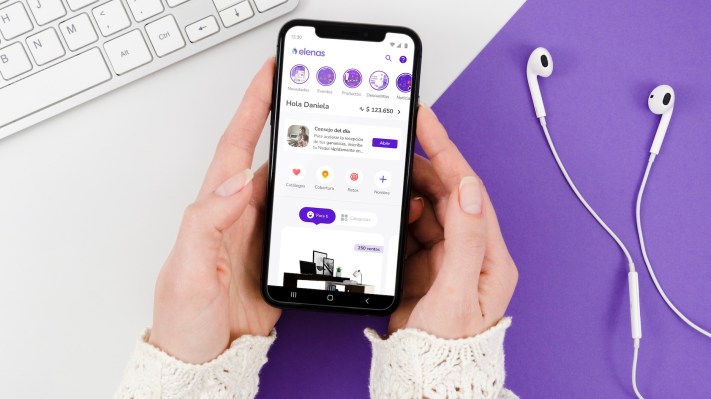Elenas estimates that 11 million women in Latin America sell consumer items via catalogs and door-to-door sales methods. It is digitizing that process so they can more easily sell from home.
Founder and CEO Zach Oschin started the Colombia-based social commerce company in 2018 (and participated in our Latin American Startup Battlefield that year) to move the traditional independent sales process online.
Here’s how it works: Entrepreneurs can browse a portfolio of hundreds of thousands of wholesale products in areas like beauty, personal care, home goods and electronics, decide what they want to sell, how much they want to mark up the price and then promote the products on social channels like WhatsApp and Facebook.
Elenas also takes care of the product sourcing, delivery and payment collection. In the past year, more than 100,000 women in Colombia and Mexico have sold over 2 million orders and earned millions of dollars on the platform.
To accelerate that trajectory, Elenas raised $2 million in seed funding in 2020 and another $6 million in Series A capital in 2021. Now the company is back with an even bigger Series B round of $20 million. This gives the company more than $28 million in total funding to date.
While Oschin didn’t go into detail on Elenas’ valuation, he did say it was an increase from the previous round. He also said the company grew revenue over 5x between the rounds.
DILA Capital leads this new investment and is joined by FJ Labs, Endeavor Catalyst, the Inter-American Development Bank’s IDB Lab, Broadhaven Ventures, Mercado Libre, Grupo Bolivar and Leo Capital.
“Elenas is revolutionizing the direct-sales industry by giving millions of people across the region the opportunity to sell thousands of products through their digital catalog,” said Alejandro Diez Barroso, managing partner at DILA Capital, in a written statement. “We are convinced that we are backing the right team in the right market and at the right time.”
Being a country with three times the population of Colombia, Mexico is poised to be the company’s largest market in the next year, and it has already “achieved a profitable and sustainable growth model” there, Oschin said.
Since launching there in 2021, Elenas was able to scale up 30%, which means Mexico accounts for more than a third of its business in just one year, which he said took two-and-a-half years to achieve in Colombia.
This is while other e-commerce companies haven’t fared as well, Oschin said. For example, he notes that by starting with lower ticket items like with grocery delivery, some companies were not able to reach the right margin profile or build out infrastructure to the level needed to reach profitability.
“There was a massive boom of social commerce companies heavily funded in 2021, but that also meant the rise of social commerce models that were highly unprofitable,” Oschin added. “Some achieve unicorn status, and we are now seeing some of those models pulling back, shut down or laying off staff.”
He went on to explain that Elenas bucked this trend by focusing on nonperishable items, like lifestyle products, home goods, fashion and accessories, from the beginning, which yielded more healthy profit margins and higher ticket prices.
Not having to build its own infrastructure was another way. That model enabled the company to scale across Colombia and Mexico and deliver to 600 towns, including rural areas where that had not been previously accomplished.
In addition to growing revenue 5x between the Series A and Series B rounds, the company more than doubled its employee headcount to 230 people.
Up next, Elenas will continue to expand its seller network in both markets with focus on scaling it up significantly over the next year so that it can invest in better products and experiences for both sellers and providers.
It will also infuse some capital into engineering and product to build out additional core features, for example, seller business management tools like customer relationship management, product recommendations and financial services.
“We want to expand into financial services that power their businesses,” Oschin said. “Fifty percent of our sellers have never had a bank account before, so this is an underbanked population, and when running a business, having financial services is important. Our partnership with Grupo Bolivar will be working on that.”
